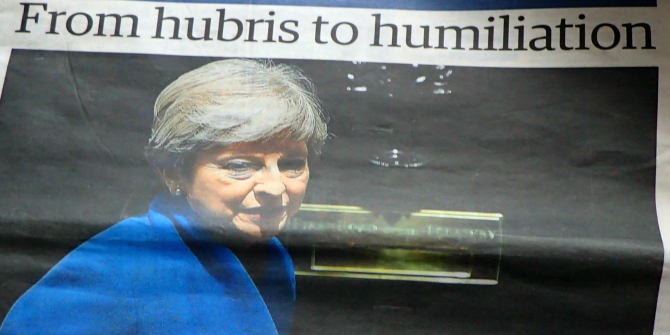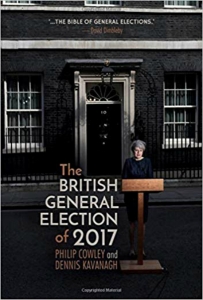Book Review | The British General Election of 2017 by Philip Cowley and Dennis Kavanagh
In The British General Election of 2017, the latest in the venerable Nuffield series on British elections since 1945, Philip Cowley and Dennis Kavanagh explore one of the most extraordinary political events of the young century in the UK: the British general election of 2017. While not able to produce a fully coherent explanation of the results, the volume achieves the same skillful blend of narrative and analysis that we have come to expect from the series, with the help of excellent sourcing and well-chosen specialist contributors, writes Lawrence McKay.

Picture: UK General Election headline, The Guardian, 2017. Picture: Gwydion M. Williams via a (CC BY 2.0) licence
The British General Election of 2017. Philip Cowley and Dennis Kavanagh. Palgrave. 2018.

On 9 June 2017, as at every election since the late 1980s, Jon Snow introduced the Channel 4 post-election programme with the words: ‘I know nothing. We, the media, the pundits and experts, know nothing.’
That day, it was probably true. In their final pre-election figures, the pollsters had substantially underestimated the Labour vote share. The 335 experts – 280 of them academics – who responded to the Political Studies Association expert survey predicted, on average, that the Conservatives would win a majority of 110 seats (though most of these predictions were made ‘before the launch of the Conservative manifesto and so at a time when the opinion polls were pointing to a 17 point Conservative lead over Labour’ (PSA)). As the results rolled in, it became plain that this was not the story of the night. The Conservatives had lost their governing majority, finishing with just 317 of 650 seats, despite consolidating the Right by decimating the UKIP vote. Only a strong performance in Scotland, at the Scottish National Party’s expense, kept them within arm’s length of government. Labour, on the other hand, gained 30 seats net, helping to suppress talk of an imminent ‘coup’ in the general election aftermath. Meanwhile, excitement around the pro-European pitches of some of the minor parties – the Greens and especially the Liberal Democrats – fizzled out.
Yet, more than a year on, we are starting to get to grips with this seismic election. March saw the release of the traditional Hansard Society edited collection Britain Votes 2017; in June, Nicholas Allen and John Bartle’s Britain At The Polls 2017, the latest in the Essex series; and, rounding out the trifecta, Philip Cowley and Dennis Kavanagh bring us The British General Election of 2017. The title is the latest in the venerable Nuffield series of election studies, dating back to David Butler, the ‘father of psephology’, and beyond. Cowley and Kavanagh’s book is, without doubt, worthy of this inheritance – while, insofar as this extraordinary election demands it, also breaking with the weight of received wisdom.
The core of the book – as with other iterations of the series – is the skillful merge of narrative and analysis that Cowley and Kavanagh achieve. The psychodramas of the political advisers and strategists Fiona Hill, Nick Timothy and Lynton Crosby, and the factional clashes between Corbyn’s office and the Blairite ‘Southsiders’ at party HQ, are each pacily told, and their relevance to the election drawn out effectively. These will be familiar to readers of Tim Shipman’s weighty Fall Out or Tom McTague’s Betting The House, but they lose little in the more condensed telling.
In some areas, the narrative and number-crunching portions reinforce each other particularly well, allowing the reader to draw out key lessons. One is that the election was as much the terror election as the Brexit election. As Stephen Cushion and Charlie Beckett show in their chapter on broadcasting, on television terror-related news made up around one-sixth of total election coverage, dominating the final weeks of the campaign; Brexit, meanwhile, took up less than one-tenth. Here, Cowley and Kavanagh’s sourcing with Tory insiders comes into its own. First, the attacks in Manchester and Westminster prevented a fightback on the social care plan and the economy. Second, perhaps the Prime Minister’s chief political achievement to date had been to cut the beloved ‘bobbies on the beat’, still associated in the public mind with security. Manchester and Westminster opened Theresa May to sustained criticism, to which Conservative Campaign Headquarters (CCHQ) had ‘no good rebuttal’. ‘The result’, as the authors mischievously remark, was that ‘the election went into its final week focusing on security and terrorism’ with a Labour party led by Corbyn, and yet ‘remarkably, it was the Conservative party that was on the back foot’.
Cowley and Kavanagh complement their book with a variety of chapters authored by well-chosen field experts: some new, others stalwarts of the series. To mention a few, ‘The Results Analysed’, by Sir John Curtice, Stephen Fisher, Robert Ford and Patrick English, provides the traditional meticulous breakdown of constituency-level electoral movements. Along the way, it also offers a useful service to readers with diverse specialist interests, touching on factors as varied as the legacy of the Scottish independence referendum, the incumbency bonus for political candidates and the ongoing ‘ethnic minority penalty’ at the ballot box. Rosie Campbell and Jennifer Hudson provide a valuable discussion of ‘political recruitment under pressure’: how did the parties choose appropriate candidates, and how did the inappropriate slip through the gaps? They highlight the endurance of the Conservative candidate revolution in the Cameron years: while the current PM May had been accused of ‘turning the clock back’ with policies on fox hunting and grammar schools, her legacy as co-founder of Women2Win was sustained in 2017. I was pleased to see that for the first time one of the chapters is authored by female academics: similarly, Britain at the Polls made such a breakthrough with its 2017 volume. We can only hope that this is the start of an overdue trend in election research.
If the book has a flaw, it is not that it lacks for an explanation of the shock result. Rather, it is that so many plausible explanations emerge, and that these are not weighed and prioritised to the extent that some readers might like. It is, however, hard to distinguish how much this is a flaw of the book itself and how much it is simply a reflection of messy reality. How do we assess the importance of Brexit against the ‘dementia tax’? How do we weigh the Labour manifesto against the role of mass rallies and the street-pounding of Momentum? It is relatively clear when Cowley and Kavanagh, or their co-authors, think something worked in the favour of Labour or the Conservatives. It is less clear what we are meant to understand as being the primary drivers of the most extraordinary turn-around in a British election campaign. Though Cowley and Kavanagh’s conclusion struggles gamely to reconcile the disparate strands, the election of 2017 continues to resist any single, coherent account.
Yet perhaps this is to ask too much. All elections are complex beasts: Cowley and Kavanagh open by quoting the introduction to the 1945 volume that the only thing certain about a general election is that ‘it is not simple’. An election that witnesses such dramatic movements at the individual, constituency and national levels may need far more determination than a more ordinary one: perhaps everything really did matter.
More than this, however, the difficulties of telling the story of 2017 might reflect the growing complexity and intensity of our political divides, both between and within parties. These are most potent, surely, among those who would seek to govern us, wherein disputes over ideas are entangled with fruitful or frustrated ambitions, with being what’s hot or left out in the cold. Cowley and Kavanagh write in the Preface that, usually, a consensus will emerge once the dust settles on an election. 2017 was different: the many versions of the story they encountered were all ‘passionately believed’. As such, 2017 was, they write, ‘a particularly difficult election to write about’. I would not bet on elections becoming any easier on the authors; but even so, should Cowley and Kavanagh continue their run, they should at least still be a joy to read about.
This review gives the views of the author, and not the position of Democratic Audit. It was first published on the LSE Review of Books blog.
Lawrence McKay is a PhD candidate in Politics at the University of Manchester. His research concerns political representation and public discontent with politicians and the political system. He can be found on social media at @lawrencemckay94. Read more by Lawrence McKay.





 Democratic Audit's core funding is provided by the Joseph Rowntree Charitable Trust. Additional funding is provided by the London School of Economics.
Democratic Audit's core funding is provided by the Joseph Rowntree Charitable Trust. Additional funding is provided by the London School of Economics.